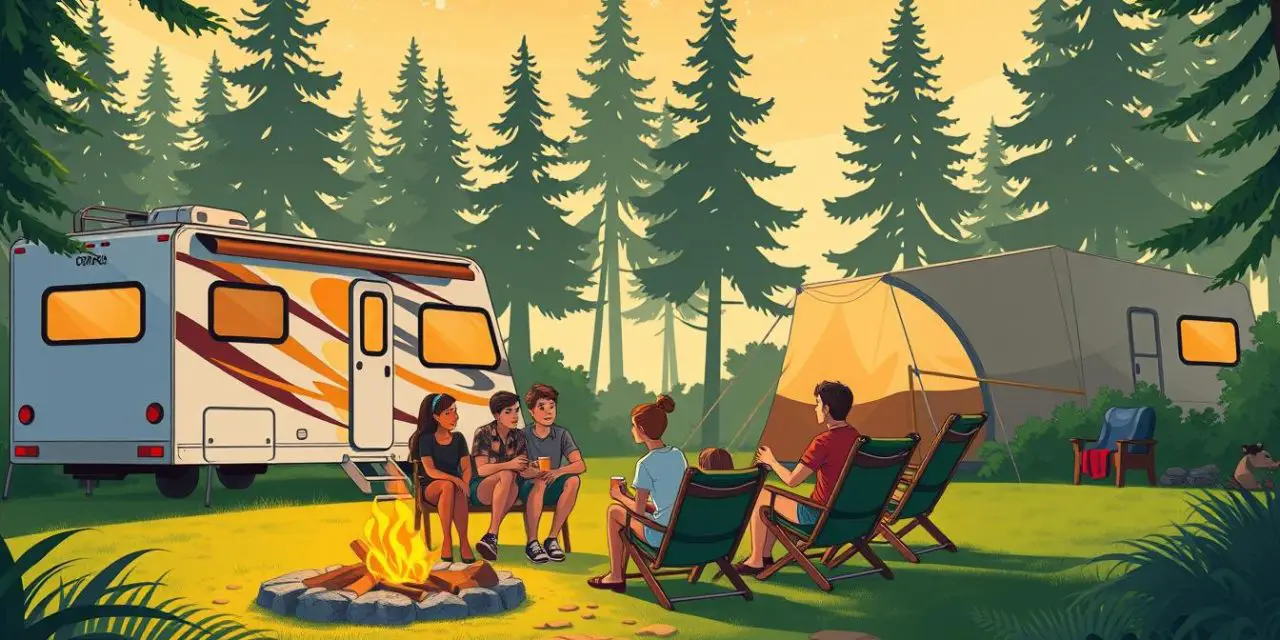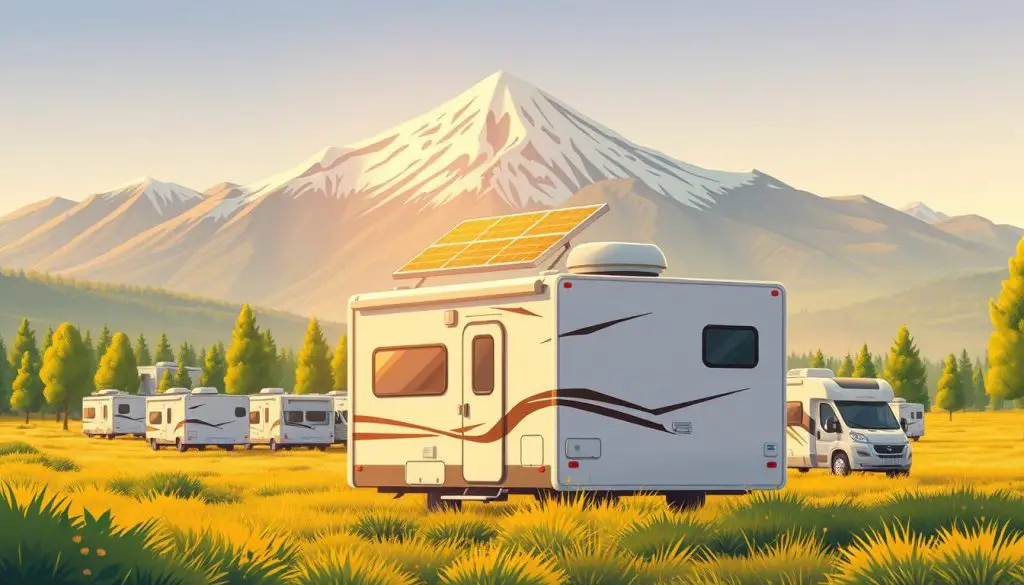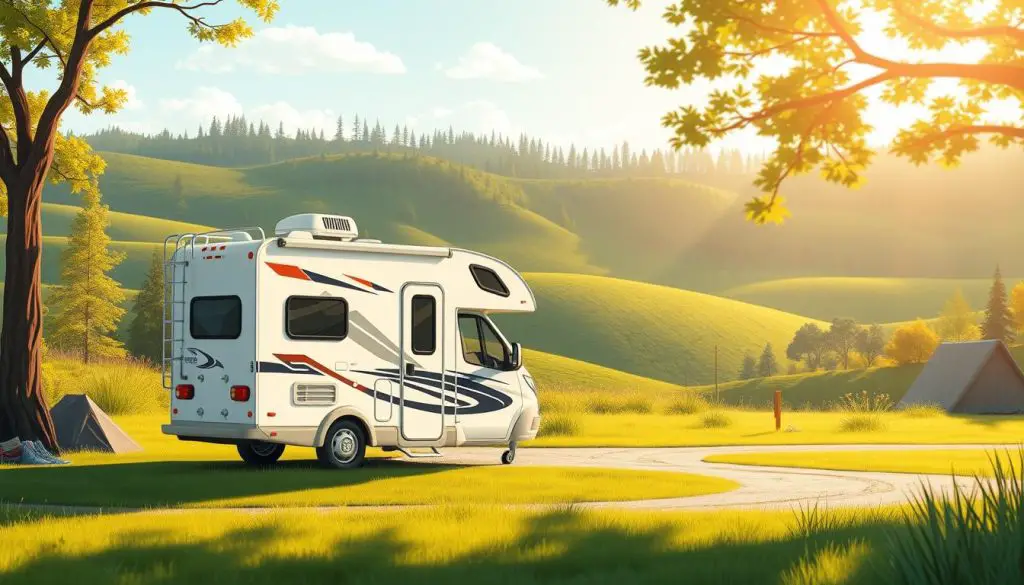The RV camping industry is seeing big changes. Younger generations are bringing new ideas and trends to outdoor fun.
Millennials and Gen Z are leading these changes. They are changing how people camp and what technology they use.
RV camping is now more diverse and easy to get into. There’s a big focus on outdoor recreation and trying new experiences.
Key Takeaways
- The RV camping industry is witnessing a demographic shift with younger generations.
- New trends and preferences are emerging, driven by Millennials and Gen Z.
- Technology adoption is on the rise in the RV camping sector.
- Diversity and accessibility are increasing in RV camping.
- Outdoor recreation and experiential travel are becoming more popular.
The Shifting Demographics of RV Ownership
The RV world is changing, thanks to younger folks who are making RVs cool again. This change isn’t just about age. It’s about a whole new set of traits that are making the RV industry fresh.
Traditional vs. New RV Owner Profiles
Older folks used to be the typical RV owners. But now, it’s a mix of young people and families. They love the freedom and fun of traveling in an RV.
Age Distribution Changes Over the Past Decade
In the last ten years, RV owners have gotten younger. Data shows that more people under 40 are buying RVs.
Key Age Distribution Statistics:
- Under 30: 15% increase
- 30-39: 20% increase
- 40-49: 10% increase
- 50 and above: 5% decrease
Education and Income Characteristics of New RV Owners
New RV owners are often better educated and have varied incomes. Many are professionals who see RVs as a way to live life on their terms.
| Education Level | Percentage of New RV Owners |
|---|---|
| High School Diploma | 20% |
| College/University | 60% |
| Postgraduate | 20% |
Industry experts say, “Young, educated RV owners are changing the RV scene. They’re making RVs more appealing to a new crowd.”
“The RV lifestyle is no longer just about retirement; it’s about adventure, freedom, and experiencing life to the fullest.”
How Younger Generations Are Changing The RV Camping Industry As We Know It
The RV camping industry is changing fast. Younger people are bringing new ideas to the outdoors. They’re moving away from old RV culture stereotypes.
New Priorities and Values in Outdoor Recreation
Younger folks are changing RV camping. They value experiences over possessions. They love the journey as much as the destination.
Experience-Focused vs. Possession-Focused Camping
Young RVers want to have fun, not just own an RV. This is why short-term RV rentals are becoming popular. They seek memorable outdoor adventures.
Adventure and Exploration Preferences
Younger RVers crave new adventures. They’re into off-the-beaten-path destinations. They enjoy activities like hiking, kayaking, and rock climbing.
The Rejection of Traditional RV Culture Stereotypes
Younger folks are shaking off old RV stereotypes. They’re making RV communities more diverse and welcoming.
Redefining What It Means to Be an “RVer”
The old RVer image is fading. Young RVers are embracing technology. They use it to make their camping better, from finding places to sharing their trips online.
Diversity and Inclusivity in Modern RV Communities
RV communities are getting more diverse and open. Everyone is welcome. This creates a supportive space for sharing and learning.
Technology Integration: Smart RVs for the Digital Native
The RV industry is changing fast, thanks to new tech. Now, RVs are smart and meet the needs of digital natives. These campers love staying connected, finding convenience, and enjoying new features that make their trips better.
Connectivity Demands in Modern RVs
Today, staying online is key, even when traveling. So, RVs now come with top-notch connectivity options.
Starlink and Mobile Internet Solutions
Starlink is a big step forward in RV internet. It gives fast, reliable internet, even in far-off places.
Smart Home Features in RV Design
Modern RVs also have smart home tech. This includes voice-controlled lights, temperature control, and entertainment systems.
Apps and Digital Tools Transforming the Camping Experience
Apps and digital tools are changing how we camp. They make RV travel more fun and easy.
Campsite Booking and Review Platforms
Apps like Campgrounds by Allstays and RV Parks by Good Sam help find and review campsites. This makes planning trips simpler.
Route Planning and Boondocking Technology
Digital tools like RV Trip Wizard and Campendium help plan routes and find boondocking spots. They make the journey better.
| Feature | Description | Benefit |
|---|---|---|
| Starlink Internet | Satellite internet for remote connectivity | Reliable internet access in remote areas |
| Smart Home Features | Voice-controlled systems for lighting, temperature, and entertainment | Enhanced living experience with convenience and comfort |
| Campsite Booking Apps | Platforms for finding and reviewing campsites | Easier trip planning with user reviews and ratings |
Technology in RVs is changing camping for digital natives. With better internet, smart home tech, and digital tools, RVs now offer adventure and comfort together.
The Pandemic Effect: COVID-19’s Role in Youth RV Adoption
COVID-19 changed how people travel, leading to more young people choosing RVs. They liked the freedom and safety RVs offered. As travel options narrowed, RVs became a safe and exciting way to see new places.
Safe Travel Alternatives During Global Restrictions
RV camping became a popular choice for young travelers during the pandemic. They wanted to see new places safely. RVs let them plan their trips and avoid crowded places.
The increase in RV rentals and sales shows a move towards safer travel. Young people liked the idea of a “home on wheels.” It let them travel safely and stay isolated.
Lasting Behavioral Changes Post-Pandemic
The pandemic changed how young people travel and plan trips. They now focus more on health and safety when choosing where to go.
New Perspectives on Domestic Travel
The pandemic made people appreciate traveling within their own country more. With travel limits, young people explored their own country in RVs. This led to more domestic RV trips.
This trend of domestic travel is likely to stick. Young travelers prefer to see local spots. The RV industry is ready to meet this demand with RVs that focus on safety and young people’s needs.
The Rise of Remote Work and “Workamping”
Remote work is on the rise, and so is “workamping” in the RV industry. This trend lets people travel while keeping up with work. It’s a mix of work and camping.
Digital Nomad Culture’s Impact on RV Sales
The digital nomad culture has boosted RV sales. More people want to work from anywhere. They look for RVs with mobile office setups and good connectivity.
Mobile Office Setups and Connectivity Solutions
Modern RVs are made for work on the go. They come with:
- High-speed internet
- Ergonomic workspaces
- Noise reduction technologies
Corporate Policies Supporting Mobile Lifestyles
Companies are changing to support mobile lifestyles. They offer flexible work and remote options. This is why RVs are becoming popular mobile offices.
How Younger RVers Balance Work and Travel
Young RVers find creative ways to work and travel. They use technology to stay productive on the road.
Productivity Challenges and Solutions on the Road
RVers face unique challenges like limited internet and distractions. Solutions include:
| Challenge | Solution |
|---|---|
| Limited internet | Mobile hotspots, internet boosters |
| Distractions | Noise-cancelling headphones, dedicated workspaces |
Community Workspaces and Resources
RV parks and campsites now offer community workspaces. They have high-speed internet, meeting rooms, and networking events.
The “workamping” trend is growing, and the RV industry is adapting. RV makers and campgrounds are meeting the needs of remote workers. They understand what modern workers need.
Sustainability Focus: Eco-Friendly RV Innovations
RV camping is getting more popular, and the RV industry is responding. They’re adding sustainable practices and green tech to modern RVs. This change is because of growing environmental awareness and a wish to lessen camping’s ecological footprint.
Green Technology in Modern RVs
Modern RVs now come with green tech that cuts down their environmental harm. A big step is in making them more energy-efficient and using renewable energy.
Solar Power Integration and Energy Efficiency
Solar power is becoming a standard in RVs, letting campers use clean energy and cut down on traditional power. Energy-efficient appliances and lights also help use less energy.
Would you like to save this article?
RV makers are now using sustainable materials in their construction. This lowers the environmental impact of making RVs. They’re using recycled stuff, eco-friendly wood, and paints with low VOCs.
Reduced Environmental Footprint Camping Practices
Younger campers are taking steps to lessen their environmental impact. They’re following Leave No Trace ethics and using water and waste management wisely.
Leave No Trace Ethics Among Younger Campers
Leave No Trace is becoming more popular among young campers. They want to keep nature safe. They’re learning to dispose of waste right, reduce campfire effects, and respect wildlife.
Water Conservation and Waste Management Innovations
Water-saving and waste management tech are key in reducing RV camping’s environmental harm. Water-saving fixtures and advanced waste systems are being added to RVs. This makes it easier for campers to be green.
The RV industry is heading towards a greener future. They’re matching the values of young people who care about the environment.
Social Media’s Influence on RV Culture
Social media, especially Instagram, has a big impact on RV culture. It shapes the RV lifestyle, especially for the younger crowd. They love the visuals and the sense of community that these platforms offer.
Instagram-Worthy Destinations and Experiences
Instagram has made some RV spots famous, calling them Instagram-worthy. It lets people share their travels, showing off amazing views and special campsites.
Viral Camping Locations and Their Impact
Some campsites became famous on social media. This fame brings more visitors, which can be good or bad for the environment and local areas.
Aesthetic Modifications and Personalization Trends
RV owners show off their unique designs on social media. This trend has led to more creative and personalized RVs, as people want their vehicles to stand out.
Online Communities Driving RV Lifestyle Trends
Online groups on YouTube and Facebook are shaping RV trends. These spaces let RV fans share tips and stories, creating a community feeling.
YouTube Channels and Influencers Shaping Perceptions
YouTube and influencers are changing how people see RV living. They share their journeys, give advice, and offer insights into the RV world, influencing their followers.
Knowledge Sharing and Skill Building Through Social Platforms
Social media is not just for sharing fun moments. It’s also for learning and improving RV skills. Many RV lovers use these platforms to pick up new skills, like fixing and maintaining their RVs.
In summary, social media has greatly influenced RV culture. It affects where people go, what they do, and how they connect. As social media keeps changing, its impact on RV living will likely grow even more.
Smaller, More Versatile RVs: The New Market Demand
The RV industry is changing fast. Now, people want smaller, more flexible vehicles. Younger folks are leading this trend, seeking affordable outdoor adventures.
Compact Camper Vans and Conversion Trends
Compact camper vans are all the rage. They’re better for driving and parking than big RVs. Plus, they let you connect more closely with nature.
DIY Conversions vs. Manufactured Options
Many are choosing DIY conversions to make their RVs unique. But, some prefer manufactured RVs for their ease and warranty.
Urban-Friendly RV Designs
New RVs are made for city living. They’re smaller and easier to park in tight spots. This makes them perfect for urban adventures.
Affordability and Accessibility for First-Time Buyers
Smaller RVs are making RVing more affordable for beginners. Prices are lower, and financing is more flexible. This is helping more people start their RV journey.
Entry-Level Price Points and Financing
There are now more affordable RV models available. Financing options have also improved. This makes it simpler for new RVers to get started.
Rental and Sharing Economy Impact
The rental and sharing economy is also a big factor. It’s making RV travel more accessible. Now, people can rent RVs or share camping trips without buying one.
Conclusion: The Future Landscape of RV Camping
The RV camping industry is on the verge of a new era. This change is driven by younger generations’ preferences and trends. They are bringing new values, like a focus on sustainability and technology.
Remote work and “workamping” have also changed the industry. Digital nomads want RVs that meet their work and travel needs. So, manufacturers are creating new designs and features for them.
The future of RV camping looks bright. It will keep evolving to meet the needs of younger people. With their love for the environment, staying connected, and flexibility, the industry will grow. RV camping will stay exciting, thanks to the creativity and passion of younger generations.









